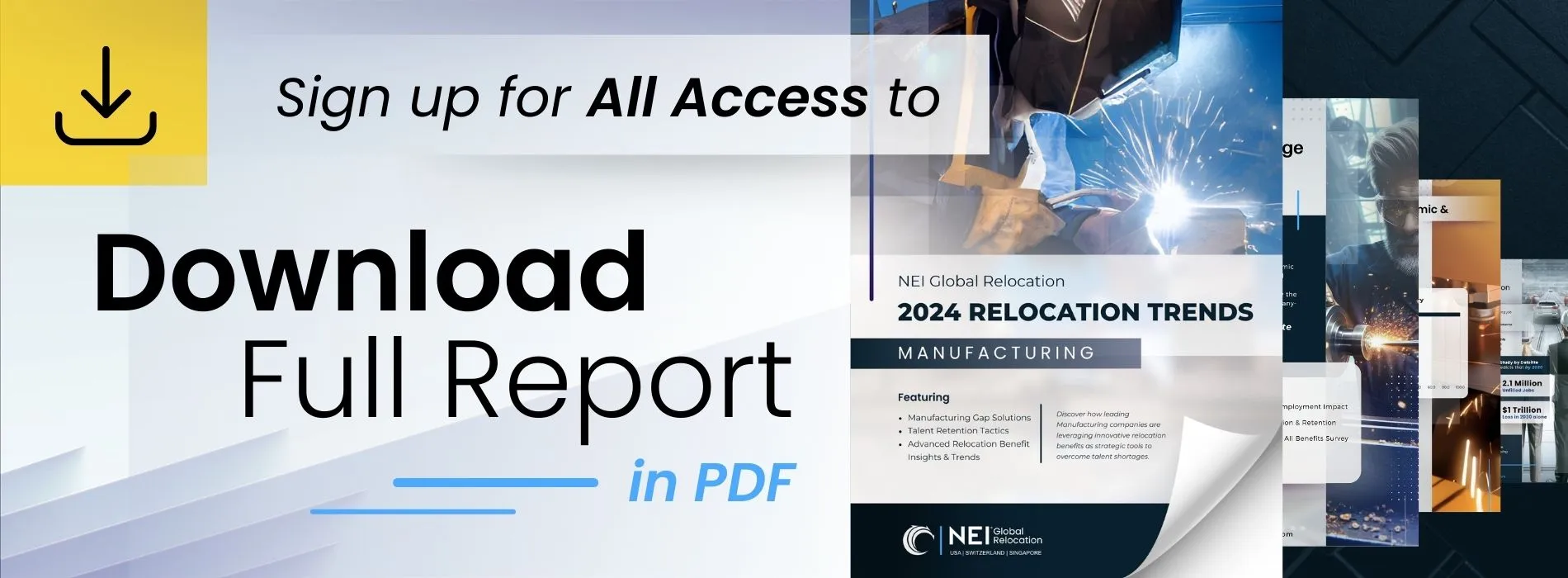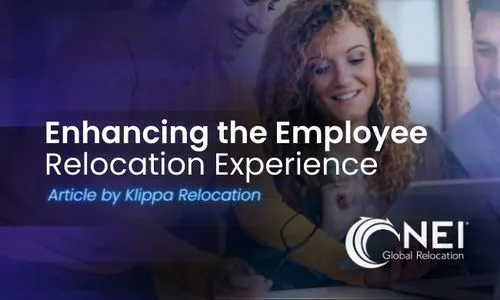Articles & Whitepapers
Client and Employee Support
With the recent outbreak of the Israel-Hamas war, we want to make sure your employees are safe and that you have the support from NEI that you need during this turbulent time.
Immediate State
- NEI is working with our clients to confirm the well-being of employees located in Israel. NEI’s International team began welfare checks on Saturday (10/7) as the news of the attacks were making their way around the globe.
- For expats who were scheduled to repatriate to Israel in the coming days, NEI is coordinating with clients to extend benefits as needed due to travel closures into Israel.
Additional Client Support
- The International Team at NEI is assisting clients with their employees that live in Israel but were not in Israel at the time of the attacks (on business travel, vacation, etc.), and are currently unable to return to Israel due to travel closures. NEI has been, and will continue to, assist with sourcing temporary accommodations until travel back to Israel is permitted.
- NEI has proactively prepared “active employee” lists for clients with global volume into / out of Israel. Employees from Israel, but not living there, may be personally affected due to the violence that has occurred with family and friends remaining in Israel. These employees are being identified to clients for awareness.
- Clients can utilize NEI to liaise as appropriate with client’s global security teams to share needed information on employees in Israel.
- Account Executives will continue to relay all information learned from employees in Israel back to the client.
Remaining Proactive
NEI continues to monitor the situation and will offer updates to our clients as they become available. Should you have any questions, or like to discuss your needs beyond your relocation population, please reach out to Mollie Ivancic, VP, International services or your NEI representative.
Protecting Renters: Avoiding Junk Fees and Spotting Scams
Apartment shopping can be stressful enough, but in today’s marketplace scammers and crafty custodians can lead to a financial maze with potentially disastrous results. This is why professional rental assistance can be so valuable.
New Rental Reality – Uncovering Hidden Fees
Median national rent prices continue to sit well above pre-pandemic levels, having risen by more than 18.5 percent in three years, and now account for 30 percent of the average American household income.
Hidden 'junk' fees and rental fraud make it difficult to accurately estimate the true cost of an apartment – especially when using different search engines online. These additional fees typically range from $5 to $50, which may seem insignificant, yet can add up with multiple line items to more than tenants budgeted for, as reported by The Wall Street Journal.
What makes the charges hard to contest is their attachment to specific services such as rent processing, trash removal, mail sorting, parking, pets, "January Fees" (an added charge in some states on the first month of the year with no apparent benefit to tenants) and even “convenience” fees to collect tenant’s rent online…which is a convenience for landlords.
Enhancing Rental Transparency
Beyond the obvious financial implications, the lack of transparency associated with these fees can mislead renters into choosing an apartment they believe is affordable, only to discover unexpected costs. Even before the pandemic, over 20 million renter households expressed concerns about housing costs jeopardizing their financial stability, according to a March report by the National Consumer Law Center.
In response, the White House took steps to enhance transparency and several online platforms have agreed to work towards disclosing all fees. Examples of efforts include:
- Zillow.com plans to display a "cost of renting summary" on its active apartment listings, summarizing all additional fees.
- Apartments.com will introduce a calculator to help renters determine the total cost of renting an apartment.
- AffordableHousing.com will ensure owners disclose all refundable and nonrefundable fees upfront in their listings.
These tools aim to make apartment hunting more transparent, allowing individuals to compare options and reduce uncertainties.
Application Fee Awareness
Prospective renters often contact multiple owners or property managers and visit several places during their housing search. Each rental application entails a fee, ranging from $50 to hundreds of dollars. This is supposedly to cover office work and background/credit checks. In a tight rental market, applicants frequently apply to multiple properties, and inaccuracies in tenant screening reports can lead to repeated rejections – despite multiple application fees paid.
The White House's recent crackdown on "junk fees" also aims to shed light on these additional application costs, aligning efforts to also address extra fees assessed by airlines and live-event platforms.
The hope is that by making all fees public, fewer apartment complexes/landlords can surprise tenants and tenants will be better equipped to make fair comparisons between rental options while searching for a place to live.
Recognizing & Avoiding Scams
Sadly, rental fraud is also on the rise. According to a recent survey conducted by Dwellsy, around 85 percent of responding renters experienced financial losses as a result from rental fraud above $400 and 19 percent experienced losses of more than $5,000. Over 60 percent of respondents reported encountering suspicious activities on digital rental platforms, such as fake landlords trying to steal a rental payment or deposit.
To secure a fair and transparent rental agreement, awareness is crucial. Scam signs include:
- Photos look too good to be true
- Listing has grammatical/formatting errors
- Pressure to sign the lease or send money prior to touring
- No credit check required
Using a qualified rental finding partner who understands the local market helps tenants steer clear of unwelcome surprises. Scams can further be avoided by:
- Always requesting a tour
- Avoiding sending money by wire
- Asking to speak with the property owner/manager
- Disregarding listings that look/feel suspicious
Through programs like Extended Rental Assistance, NEI works directly with qualified rental finding partners – giving each agency both verbal and written guidelines outlining the anticipated needs of relocating employees, setting expectations, specifying timelines, and reporting protocols for the rental search. Following the agent's initial engagement with the transferring family, additional follow-ups between NEI and the partner occur during and after the rental finding trips. As always, communication is maintained with the employee through the lease finalization process.
In Summary
Renting an apartment can be complex, but being equipped with the right knowledge is critical to making it a stress-free process.
New tools from platforms like Zillow, Apartments.com, and AffordableHousing.com will undoubtedly aid employees, however, having multiple options, back-up plans, and working with a trusted rental-finding agency can make all the difference in ensuring successful employee transitions.
Ensuring the peace of mind and productivity of our clients’ employees remains our top priority. NEI’s Client Relations Managers work with each of their clients to discuss the most cost-effective approaches available. If you would like to discuss this or other relocation trends or cost-saving solution ideas, please reach out to your NEI representative.
This material has been prepared for informational purposes only, and is not intended to provide, and should not be relied on for, tax, legal or accounting advice. You should consult your own tax, legal and accounting advisors before engaging in any transaction.
10 Things That Will Surprise You When Relocating to Dubai
Dubai continues to rise in popularity when it comes to international relocation and global mobility. Whether it is its reputation for safety, its unique business opportunities or its year-round sunshine, there are so many attractive elements about the city that keep drawing in new people every day.
If you want to know more about this in demand destination, click here.
NEI is proud to feature how our service partners support your employees and their families as they relocate and transition to all points of the globe. EER Middle East is the region’s leading supplier of relocation, immigration and corporate services in Saudi Arabia, Bahrain, Qatar, Oman, Kuwait and the UAE.
Global Mobility Leader Achieves Top Rankings in Willingness to Recommend and Continuation of Services
NEI Global Relocation proudly announces its outstanding performance in the 22nd Annual Relocation Managers Survey© conducted by Trippel Survey and Research, LLC. Demonstrating unparalleled commitment to excellence, NEI has secured the top position in the highly coveted categories of Willingness to Recommend and Continuation of Service, reaffirming its status as a premier Relocation Management Company.
#1 Willingness to Recommend
“It means a great deal to us that our clients feel comfortable and even excited to recommend us to their peers in the industry.” Randy Wilson, President and CEO of NEI Global Relocation, remarked. “We try very hard to pursue collaboration with quality clients that align with our culture of excellence, so to have those same people willingly advocate for our services speaks volumes.”
Commenting further, Wilson expressed, “This recognition reinforces our belief in the power of genuine relationships and the impact of delivering exceptional relocation experiences. We see it as a validation of our commitment to not only meet but exceed expectations, and it motivates us to continuously elevate our standards. We are grateful for the confidence our clients place in us and are dedicated to maintaining the level of service that inspires such positive recommendations.”
#1 Continuation of Service
In speaking on receiving the top ranking for Continuation of Service, Wilson commented, “It’s incredibly satisfying to see the deep trust our clients place in our services and the dedication of our team to uphold the highest standards of excellence. It not only validates our commitment to excellence but also reinforces our resolve to innovate and adapt in an ever-evolving industry. This especially isn’t just an honor; it's our motivation to continue forging productive relationships and delivering unparalleled service for those in our care."
The dual triumphs in Willingness to Recommend and Continuation of Service solidify NEI Global Relocation's position as a trusted partner in global mobility. In securing top marks across various key metrics in the 22nd Annual Relocation Managers Survey©, NEI Global Relocation demonstrates steadfast dedication to service excellence and client satisfaction. This consistent high performance, recognized broadly in the industry, reinforces NEI's commitment to provide reliable and first-rate relocation services.
About NEI Global Relocation
NEI Global Relocation is a leading Relocation Management Company, providing comprehensive global mobility solutions. With a commitment to excellence and a focus on building lasting client relationships, NEI ensures seamless employee relocations worldwide. For more information contact your NEI representative or click here.
Navigating Changes in Corporate Relocation and Benefits
NEI recently completed our 2023 U.S. Domestic All Benefits Survey. The survey covered all components of a typical U.S. domestic program, including policy overview, origination/departure services, destination services, the home sale process, and tax assistance. The top participant industries were Manufacturing, Medical/Pharma, Technology, Energy & Utilities, and Oil & Gas. There were 224 participants and forty-five policy components included in the survey, the key takeaways focused on flexibility in mobility programs, economic impact of policy changes, an increase in the number of renters, and the addition of Diversity, Equity & Inclusion (DEI) options for relocating families.
Program Flexibility & Policy Structure
The survey indicates that more and more companies are responding to the ever-changing needs of employees and internal business units by including more flexibility in their policy structures. The 4-tiered policy structure is the most common way to meet these needs, which is a slight increase from 3 tiers in 2022.The usage of core-flex programs has also increased, as have lump sum-only programs, which have increased from 2% to 3% by offering incentives to lower-tiered employees.
Influx of Renters
Traditionally, it was common for companies to assume their higher-tier employees would receive home sale benefits as part of their relocation package. However, survey results show that companies have noticed an increase in higher-tier renters and have responded by adjusting their lease cancellation benefits, with executive-level rental finding assistance increasing from 53% to 56%. Lease cancellation reimbursement ordinarily equals up to two months’ rent, but our research shows that nearly 11% of companies offer up to three months’ rent, likely at the higher policy levels.
Because an increase in the offering of rental finding assistance has been noted and is consistent with the increase of lease cancellation benefits, NEI recommends that companies offer all employees rental finding assistance, regardless of housing status in the old location.
Economic Impact on Policy
Another factor influencing client decisions is the economic impact of policy parameters such as Loss on Sale, Cost of Living Adjustments (COLA), and Mortgage Interest Deferral Assistance (MIDA). Though the housing market is slowing slightly, Case-Shiller reports that prices are still increasing. While it is still possible for employees to experience loss, NEI recommends companies prepare an addendum to policy for unique or “one-off” loss on sale situations.
One question NEI kept in mind while preparing the survey was “Are more companies offering COLA and MIDA with the cost of living increasing and the mortgage interest rates climbing so much?”
According to the survey, the answer is not really. With the cost of living increasing everywhere, the use of COLAs has risen from 7% to 11%, which is a relatively small increase compared to the rise in living expenses, but the expectation is that usage could increase more in the coming years. Additionally, for MIDA, only 2% of companies offer it for their Executives and 1% for their Directors and VPs.
When considering implementation of a MIDA program, NEI encourages companies to consider the interest rate differential increase rather than the interest rate itself. While MIDAs of old used to impose an 8% minimum rate for eligibility, the differential was typically only 2-3%. Though rates are now still below that prior 8% threshold, we’ve seen an increase of nearly 5% for some homeowners who purchased around 2%. A more appropriate method would incorporate the MIDA based on a minimum differential vs. the rate.
Diversity, Equity & Inclusion
The Benefits Survey shows that companies are incorporating DEI into many aspects of their corporate structure, including their relocation programs. Because the most common reason for an unsuccessful or declined relocation is spouse/family issues, there has been a significant shift from career assistance to family acclimation services.
New to the survey this year, DEI benefits are now outlined by 9% of survey respondents, a trend that NEI expects will continue to grow. The most common type of DEI benefit is employee/family integration assistance (44%), followed by DEI-specific allowance (28%) and flex benefit options to meet any need (22%). Also noted by some was their desire to minimize the gap between homeowner and renter benefits, bringing more equity to their programs in that way. As a result, new home closing costs are being more frequently offered to former renters.
Looking to Stay Ahead of the Curve
In addition to the topics outlined above, one subject expected to receive even more attention in 2024 is the 2017 Tax Cuts and Jobs Act, which will either be extended or expire in 2025. If the Act expires and the excludability of some tax expenses is reinstated (e.g. household goods and final move benefits), companies may experience a decrease in tax gross-up expenses, lessening the burden of otherwise rising costs.
If you would like a copy of the 2023 U.S. Domestic All Benefits Survey in its entirety, please contact your NEI representative or click here.
Shipping Disruptions Impact Relocation
International shipping faces several disruptions heading into 2024, making it hard to forecast how things will play out.
Situation:
While freight rates are lower when compared to the recent past, concerns over rising costs and delays in import shipments are again increasing due to these developing situations:
Middle East – Red Sea
Attacks on cargo ships in the Bab-el-Mandeb Strait of the Red Sea – where about 12 percent of global shipping sails through – have prompted hundreds of cargo ships carrying over 2 million containers to reroute from the Red Sea. Rerouting will result in longer transit times and elevated costs.
Changing a cargo ship’s route from Asia to Europe around the southern tip of Africa, rather than using the Suez Canal in the Red Sea, represents a major detour. For example, a cargo ship’s voyage from Singapore to Rotterdam would be extended by 3,300 miles, a 40 percent increase, adding approximately 10-to-14 extra days in transit and sizeable costs.

With the international community mobilizing to stop this disruption to global trade, it is possible that these ship diversions could end soon, but only time will tell.
Central America – Panama Canal
Simultaneously, the 50-mile-long Panama Canal – which 5-to-6 percent of global shipping flows through – has had a 33 percent capacity reduction due to a drought, posing challenges in the shipping bottleneck area. Ships moving through the canal have faced wait times of up to three weeks. Delays are expected to continue until April / May 2024, when the rainy season is expected to raise the low water levels and end the region’s drought.
North America – US Mexico Border and West Coast Ports
Congestion of freight traffic at the Mexico-U.S. border is escalating and likely to continue its upward trend. This increase stems from the U.S. actively suspending freight train services across the border to counter unauthorized migrant crossings. The resulting shift from rail to truck transport for containers could significantly impact freight capacity, costs, and transit durations.
Both shippers and the broader supply chain should remain attentive to the potential recurrence of increased activity and congestion at major U.S. west coast ports next year due to an anticipated surge in cargo from Asia to U.S. East Coast. This surge could strain trucking services and create logistical delays similar to those experienced during the pandemic.
What You Can Do
Companies should look for rate increases and a potential rise in incremental costs due to delayed shipments (e.g., temporary housing), as well as increased stress from relocating employees who will have to wait longer than expected for their goods.
If NEI is not managing your international shipments, we recommend:
- Budgeting for additional freight rates in your cost estimates
- Working with partners to develop processes that include verification that freight increases are genuine
- Questioning rates that are much lower when compared to the overall market; which is often an attempt to lock in business with large increases coming without warning
NEI Guidance
Be prepared for these shipping trends to continue. Consider reasonable policy changes going forward, like the following:
- Allowing exceptions specifically due to continued and new shipping disruptions in 2024
- Setting new expectations with relocating employees
- Considering alternative policy options for shipping international household goods
NEI remains committed to managing client costs for every move. Our Client Relations Managers will collaborate with each client to identify the most cost-effective options for international household goods shipping. They will also discuss providing a small allowance to employees for the extended transit period without their goods.
In Summary
NEI and our service partners will keep you posted on this developing situation, but if you would like to discuss policy changes or options to reduce global container shipment costs, please reach out to your NEI representative or Mollie Ivancic, NEI’s VP, International Services.
This material has been prepared for informational purposes only and is not intended to provide, and should not be relied on for tax, legal or accounting advice. Please consult your own tax, legal and accounting advisors before engaging in any transaction.
Navigating New Mileage Rates, Tax Bracket Changes, and More for Relocation
With the new year comes new caps, tax tables and allowances from the U.S. Internal Revenue Service (IRS). Listed below are the areas related to relocation for tax year 2024.
Standard Mileage Rate
The IRS announced an increase of the optional standard mileage rates for 2024. The standard mileage rates for the use of a car (also vans, pickups or panel trucks) will be:
- 67 cents per mile driven for business use, an increase of 1.5 cents from 2023.
- 21 cents per mile driven for medical or moving purposes for qualified active-duty members of the Armed Forces, a decrease of 1 cent from 2023.
- 14 cents per mile driven in service of charitable organizations; the rate is set by statute and remains unchanged from 2023.
Most companies follow the IRS guidelines to calculate the mileage reimbursements for final move expenses when driving to the new location. This rate increase will affect mobility programs:
- If you are an NEI client who has elected to follow IRS guidelines for your expense administration, nothing is needed at this time. NEI will incorporate the mileage change into your expense reimbursement policy, as agreed.
- If you are an NEI client who has not elected to follow the government established mileage rates in the past, NEI will continue to follow your prescribed rates unless you advise us that your company is changing the rate. Please contact your NEI Client Relations Manager directly, if you would like to confirm or update your current rate.
IRS Federal Income Tax Brackets and Rates
The IRS has also announced new 2024 tax year tax brackets, for taxes one will file in April 2025.
- The IRS has adjusted the brackets for 2024 based on inflation, which is considered annually.
- One’s tax bracket depends on one’s taxable income and filing status: single, married filing jointly or qualifying widow(er), married filing separately and head of household.

Standard Deductions
Standard deduction amounts have also increased:

Social Security Wage Limit
The Federal Insurance Contributions Act (FICA) requires companies to withhold three separate taxes from the wages paid to employees. The largest tax of these three is the Social Security, also known as the Old Age, Survivors and Disability Insurance Program (OASDI).
For 2024, the FICA tax rate for both employers and employees is 7.65% (6.2% for OASDI and 1.45% for Medicare) to be paid on the first $168,600 of wages in 2024. This is up from $160,200 in 2023.
$10,453 is the maximum amount of Social Security tax that will be deducted from an employee’s paycheck in 2024. This is an increase from $9,932 in 2023.
Supplemental Tax Withholding Rates
As standard for previous years, the supplemental Federal rate is 22% for those who make under $1 million remains unchanged, as does the 37% supplemental rate for those who exceed $1 million.
In Summary
As your relocation partner, NEI is here to explain year-end tax questions for your relocating employees. If you have any question about these changes, please contact Jaymi Stacy, NEI’s Sr. Director of Expense Disbursements, or your NEI Client Relations Manager at 800.533.7353.
This material has been prepared for informational purposes only and is not intended to provide, and should not be relied on for tax, legal or accounting advice. Please consult your own tax, legal and accounting advisors before engaging in any transaction.
NEI’s Brian Digan Receives the NTRP 2023 Saul Gresky Relocation Professional of the Year Award
NEI Global Relocation is delighted to announce that our own Brian Digan, Vice President of Client Development, is the 2023 recipient of the North Texas Relocation Professional (NTRP) Saul Gresky Award.
This honor is bestowed upon an exceptional corporate or relocation service professional who embodies the essence of outstanding customer satisfaction, going above and beyond to serve corporate employees in their relocation journeys.
Located in Dallas, Brian boasts 40 years in the industry, fostering relationships with diverse corporations across multiple cities. Through his unwavering commitment to the industry, Brian has contributed significantly to enhancing the positive image of the relocation profession, fostering collaboration and support across numerous groups.
A proud Villanova University alumnus, Brian earned his MBA from the University of Connecticut School of Business and, as NTRP Treasurer, Brian has helped the group provide a forum for education and networking in all areas of relocation by both corporations and service sectors of the industry.
In an industry where service, ethics, and professionalism are key, NEI Global Relocation celebrates Brian for his industry efforts, achievements, and winning this year’s Saul Gresky Award.
Congratulations, Brian, for your dedicated and positive impact on improving corporate relocation experiences for employees and companies. Your efforts are truly appreciated.
Global Payroll Compliance and Accuracy
Ensuring compliance with a country's payroll reporting and withholding regulations, along with accurately managing the evolving intricacies of international relocation compensation, is crucial. While this can be intimidating, especially for those new to corporate global mobility, it doesn't have to be.
As global payroll operations for assignees (employees who work outside their home country) have become increasingly complex, global companies are placing increased importance on having effective compensation/payroll operations.
Tax authorities around the world have sought to increase revenue through additional taxation and more stringent enforcement of wage and tax reporting requirements, according to Deloitte.
“The market is experiencing a spike in payroll audit activity and reputational risk…Organizations and their mobile workforce are becoming increasingly visible to revenue authorities who require strict compliance with payroll reporting requirements, thereby creating challenges for internal functions such as Mobility, Tax, Payroll and Finance,” Deloitte reported.
Of surveyed companies, 67 percent now have a formalized payroll strategy in place according to an EY Global Payroll Survey. EY also found organizations with formal payroll strategies have a more efficient payroll operation: “Simply stated, organizations with formal and documented payroll strategies built a more efficient payroll operation than those without a formal policy.”
Tailored Global Compensation Solutions
NEI streamlines payroll reporting with tax partners for clients, providing global compensation accumulation and reporting in-house. We further coordinate with each client’s payroll and tax partner to ensure all details are accurately captured. This benefits our clients through:
- Less work for client teams, freeing up time for other core responsibilities
- Potentially lower costs with the tax partner, as they can easily have all the details captured for filing without spending billable time gathering information or seeking data clarifications
Including the identified tax firm as part of our implementation / transition process for new clients creates a clear system and establishes expectations for required reporting formats, timing of scheduled reports, and year-end reports.
Tailoring procedures to client-specific payroll and accounting timelines directly benefits companies. We engage client global payroll departments to transmit data and discuss process / timing needs in order to coordinate filings with each client’s tax partner.
NEI can also work in conjunction with a company’s tax firm if they participate in the local calculations. If tax preparation services are outside of policy, we work within a client's designated parameters to determine appropriate timing, format, and information for payroll contacts.
We Work with Experts, So You Don’t Have To
NEI manages global compensation of international assignments holistically and in conjunction with compensation experts to obtain approved allowances and differentials for each individual employee.
Doing so allows us to provide compensation information to each client’s payroll and global tax firm to ensure both have the data needed for making payments and properly reporting total employee income. As with all services, NEI can work with either our partners or client-preferred partners to meet each client’s unique needs.
If a company expands into a new country and lacks a local payroll system, which may be mandated by local law, NEI can facilitate the coordination of payroll services in specific countries. This is managed through our accounting service partners, renowned for their extensive experience in handling international payroll and accounting systems. They provide a comprehensive suite of cross-border services, including setup, payroll management, accounting, tax compliance, and advisory services. These services are tailored to meet the individualized needs as specified by NEI.
Stress Free Support
NEI works closely with each client and their tax firm to report payments made to or on behalf of assignees throughout the year. We offer comprehensive support so that clients’ global compensation compliance requirements are met in a timely manner. Additionally, we will review programs and suggest improvements where necessary.
To learn more on how NEI can assist with compliance regarding Global Compensation, please contact your NEI representative or Michelle Moore, CPA, MPA, CGMA, Chief Global Mobility Officer.
The text above is provided for informational purposes only. Please consult your tax, legal, immigration or accounting advisors before making any decisions or transactions.
A Cultural Phenomenon Across Continents
Carnival or “Carnaval” is an annual celebration steeped in tradition, energy, and extravagance, acknowledged across the world in more than 50 countries—running from 8 February 2024 through 13 February 2024.
The word Carnival itself likely came from the Latin carne levare, meaning “remove meat,” in reference to the Christian period of Lent, a time of fasting, and marks a time of festivities, parades, masquerades, and feasting before the more solemn and reflective period of Lenten sacrifice.
For employees on international assignments, the energy and excitement surrounding Carnival can offer a memorable and enriching experience, immersing them in the cultural vibrancy, traditions, and community spirit of their host countries.
A Cultural Phenomenon
Most people will agree that Carnival is not simply another festival, but a cultural phenomenon. South America usually comes to mind as the most famous locations for celebrating the holiday with its energy and flamboyance:
- Rio de Janeiro, Brazil is the ultimate Carnival destination and the world’s most famous celebration spot with over a million people from across the globe typically visiting to dance, sing, have fun in the streets, at the beach, and partake in the Rio Parade.
- Salvador, Brazil’s Carnival has an African flavor with expressions of Afro-Brazilian folklore, music, and dance. Crowds dancing in the streets are fueled by the loud sounds of the region’s famous motorized floats carrying musicians and singers.
- Bolivia’s elaborate, 10-day Oruro Carnival is so good it’s said to be one of the world’s best festivals. UNESCO has recognized it as a 'Masterpiece of the Oral and Intangible Heritage of Humanity'. The celebration lasts 20 hours and combines Indigenous and Catholic traditions with amazing parades.
Sounds exciting, but did you also know Carnival’s also celebrated in over 50 countries, each with their own unique spin on the event?
About Excess and Enjoying Life to the Fullest
For employees on assignment, Carnival can become a captivating blend of celebration and mystery, characterized by vibrant crowds, imaginative outfits, and elaborate masks. For example:
- Basel, Switzerland is well known for its celebrations each year, rejoicing with a parade of over 20,000 noisy revelers marching through the streets and parties in the city for hours after
- Istanbul, Turkey hosts the Baklahorani Carnival celebration featuring a masked parade through the streets and parties in the surrounding areas.
- Santa Cruz de Tenerife, Spain boasts nine continuous days of loud, boisterous celebrations during Carnival with elaborately plumed costumes and masked merrymakers in the streets.
- Dusseldorf, Germany’s Carnival takes place on the banks of the Rhine. It has a day of festivities dedicated entirely to family-friendly celebrations and is known for its “Rose Monday” street parade featuring colorfully decorated floats, more than 5,000 costumed performers, and capacity crowds that flood the city’s pubs and restaurants.
- Goa, India’s Carnival has been a fixture for 500 years and includes parades, colorful costumes, music, dancing and intricate floats in the streets with many parties.
- Venice, Italy has made it a tradition to gather with friends every Carnevale, but across the city’s piazzas, “Carnevale” draws many thousands from around the world. They don costumes and gather at pubs and restaurants, enjoying wine and cicchetti (appetizers).
- Slovenia, where Carnival is called Kurentovanje (koo-rent-oh-VAWN-yeh), has a celebration season that culminates in the town of Ptuj where merrymaking, concerts, parades, masked balls, and kids' events last days.
- Nice, France hosts three kinds of parades: the Bataille de Fleurs (Battle of Flowers), Corso Carnivalesque Illumine (Parade of lights) and the Corso Carnavalesque (Carnival Parade). Each float has a different theme.
- Binche, Belgium hosts loud cultural performances and presents unexpected rituals like revelers throwing oranges for good luck while performers dress in elaborate, feathery hats.
Employees on assignment in the U.S. have access to celebrations as well, and it’s not limited to Mardi Gras in New Orleans. Cities with notable Carnival/Mardi Gras events can be found in:
- Baton Rouge & Lafayette, Louisiana
- Orange Beach & Mobile, Alabama
- San Diego, California
- Orlando, Tampa & Pensacola, Florida
- Galveston, Texas
- Biloxi, Mississippi
- St. Louis, Missouri
- Washington, D.C.
Expats Celebrating Local Culture
Carnival celebrations across the globe serve as a testament to the beauty of cultural differences coming together in a harmonious celebration.
Employees on international assignments often gain insights into the host country's culture through experiencing local Carnivals, which can add value to the overall experience while on assignment.
Often, employees on assignment will get together with locals and other expatriates to celebrate and, for employees returning from international assignments, the exposure to diverse traditions can become a cornerstone for fostering a stronger global mindset.
New holidays, traditions, and memories in assignment destination countries might be different, but with an open-mind—exploring the local holidays and traditions around the world can prove a fun, educational, and memorable experience.
Enjoy your 2024 festivities!

The Talent Shortage is Not Temporary
“Manufacturers are expected to face economic uncertainty, the ongoing shortage of skilled labor, lingering and targeted supply chain disruptions, and new challenges spurred by the need for product innovation to meet company-set net-zero emissions goals.” ~ Deloitte
Manufacturing accounts for about 11 percent of U.S. GDP and employs approximately 8 percent of the U.S. workforce, but U.S. manufacturing jobs have declined from 19.6 million in 1979 to nearly 13 million by November 2022 – a significant 56 percent decrease when adjusted for population growth.
Yet, as of August 2023, 616,000 U.S. manufacturing job openings are still needing to be filled. The industry’s talent shortage, per Betterworks Engage, can be attributed to:
- Outdated perceptions that manufacturing jobs aren’t safe, clean, or progressive
- Misconceptions by younger generations that manufacturing lacks competitive wages
- Perceived lack of investment in employee growth and development
- Not enough STEM graduates with specific skill sets and abilities to meet demand
- A quarter of the industry’s skilled worker base retiring, with more to come in the next decade
In fact, 77% of manufacturers say this shortage is not temporary and there will be ongoing difficulties attracting and retaining workers in the industry.
The manufacturing skills gap in the U.S. could result in 2.1 million unfilled jobs by 2030, according to a study by Deloitte and The Manufacturing Institute. The cost of those missing jobs could potentially total $1 trillion in 2030 alone. This is true for both talent skilled in the design and operation of old and new machinery, as well as the usual positions that are always needed across manufacturing companies to conduct business.
To attract new talent from various sectors, manufacturers must bridge the gap between the expectations of job seekers and the reality of manufacturing jobs, as highlighted by a Deloitte Global Human Capital Trends study. It's crucial for these companies to focus on widening their talent pool, fostering inclusive work environments, and committing to ongoing skill development to ensure future success.
Key Findings from NEI’s Global Relocation’s 2023 All Benefits Survey
To address these shortages, manufacturing industry Talent Management and HR teams will have to evolve and maximize relocation efficiency and effectiveness to secure talent and retain employees. This starts with examining the benefits used today and ensuring they are ready for tomorrow.
Notable findings from Manufacturing companies participating in NEI Global Relocation’s 2023 U.S. Domestic All Benefits Survey include the following:
Partial Lump Sum
- Manufacturing companies tend to favor a Partial Lump Sum program to cover certain benefits such as temporary living, home finding, return trips, final move and miscellaneous expense allowance.
- A partial lump sum was offered by 31 – 67% of Manufacturing companies (depending on employee level) as compared to 30 – 51% of participants in all industries combined.
Economic Impact on Policy
- Unlike other industries, Manufacturing has not increased COLA, MIDA or Lease Cancellation due to economic changes, choosing instead to stay the course.
- Many companies in NEI’s U.S. Domestic All Benefits Survey (all industries combined) have reviewed and revised policy components to adjust to the changing market.
Home Sale Trends and Responses
A strong sellers’ market over the past few years has caused many companies in multiple sectors to tighten up their home sale programs, scaling down benefits to save money without significantly impacting employees. As the market pendulum starts to swing back to the buyers’ favor, companies are beginning to consider ways to enrich their home sale programs again.
- BVO is preferred over GBO by Manufacturing participants. BVO is offered by 7 – 47% of Manufacturing participants compared to 5 – 33% of participants in all combined industries.
- GBO is offered by 0 – 35% of Manufacturing participants compared to 1 – 43% of participants in all combined industries.
- Loss on Sale is offered by 0 – 20% of Manufacturing participants compared to 1 – 34% of participants in all combined industries.
Tax Treatment
- Manufacturing participants were less likely to gross-up origination services(e.g. partial lump sum, home sale reimbursements, miscellaneous expense allowance), and yet more likely to gross-up destination services (e.g. temp living, rental finding assistance, home finding trip).
- Of Manufacturing participants, 45% complete year-end true up calculations compared to 34% of participants in all combined industries.
In summary, manufacturing companies lean towards more conservative relocation policies, such as favoring Partial Lump Sum programs and maintaining steady course on COLA, MIDA, or Lease Cancellation policies despite economic shifts. This approach is distinct from broader industry trends, where companies are revising policies to adapt to market changes.
A company within the manufacturing sector that adopts a more robust and forward-thinking relocation policy not only differentiates itself but also has a golden opportunity to secure and retain the industry's best talent. As the landscape evolves, those willing to enhance their benefits in thoughtful ways could obtain a sizable competitive advantage.
Investing in Future Competitiveness Today: The Role of Relocation
“Manufacturing is no longer the old-fashioned assembly-line industry of yesteryear. Manufacturing today is taking center stage as an electrifying industry full of possibilities.” ~ Forbes
With expense reduction top of mind for many, it is imperative for Manufacturing companies to identify and consider cost savings opportunities, but also leverage innovative relocation services, technologies, and expertise when addressing talent needs.
NEI Global Relocation strives to be in complete alignment with each client’s priorities, business objectives, and talent management goals.
When choosing the best global relocation management partner, look for a trusted, stable firm with experienced professionals and extensive global networks. A partner that will deliver you the best return on investment, proactively advise you on current and future trends, and support your efforts to secure and relocate talented candidates.
For more information, please contact your NEI representative.
About NEI Global Relocation
NEI is a certified Women’s Business Enterprise headquartered in the U.S. with in-region offices and teams in Switzerland and Singapore. As a full service, global relocation and assignment management company that partners with clients across the globe to provide consultative guidance and solutions, NEI has over 200 clients including many Fortune 500 and Fortune 1000 corporations and we support client Tier 1 and Tier 2 supplier diversity goals each year. For more information and other articles, see www.neirelo.com.
The above article is provided for informational purposes only. Please consult your tax, legal, or accounting advisors before making any decisions or transactions.
Understanding Barriers and What To Do
A family’s reluctance to relocate can often stem from a variety of hesitations. Whether that be a spouse’s need to re-establish their career in the new location, loss of established social and professional networks, as well as concerns regarding children acclimating in school, activities, and friendships. As Jennipher Christensen of IPR Consulting aptly said, “Getting to... ‘what do they need and how can we help them?’ is critical in the pre-decision phase. This involves not just showcasing the new location but helping them visualize their life and addressing concerns of each family member.”
Easing the Transition
Caring for the well-being of employees and their families necessitates comprehensive policy frameworks that prioritize support and inclusivity throughout the relocation process. These services aim to minimize the challenges associated with relocation and ensure that employees can quickly adapt to their new environment:
- Destination Services and Area Orientation: Assistance finding suitable housing, schools, transportation, banking, healthcare, and other essential services in the new location. Offered by 86% of companies for international permanent transfers, 60% for short-term assignments, and 83% for long-term assignments. Though area orientation is typically part of a home finding trip for US Domestic transfers, formalized area orientations in the US are becoming more common.
- Cultural Training: Programs to familiarize employees with the local culture, customs, and etiquette to facilitate smoother integration into the community. Offered by 65% of companies for international permanent transfers, 70% for short-term assignments, and 82% for long-term assignments.
- Language Support: Language training services to help employees become proficient in the local language. Offered by 62% of companies for international permanent transfers, 60% for short-term assignments, and 76% for long-term assignments.
- Family Acclimation Assistance: Services designed to assist the spouses and families of relocating employees by addressing their specific needs and concerns. This support includes spousal career assistance, community integration, and ongoing support. Offered by 51% of companies for international permanent transfers, 10% for short-term assignments, and 61% for long-term assignments. Depending on employee level, the benefit is offered by up to 35% of companies for US Domestic transfers.
Policy Implications and Recommendations
The intricate dynamics of family involvement in corporate relocations require careful consideration of how to navigate this terrain with empathy and efficacy. Formulating actionable policy changes not only serves the immediate interests of employees and their families but also aligns with broader organizational objectives of talent retention, productivity, and corporate social responsibility.
Effective relocation policies must address various aspects of a transferee and their family’s transition. Here are some key recommendations:
- Comprehensive Acclimation Services: Expand services to include cultural training and pre-assignment assessments. These are essential components of the relocation package.
- NEI’s YOU Allowance: Consider introducing this flexible allowance, which can cater to the unique needs of each family.
- Support for Single Transferees: Recognize that finding social support systems and activities through a Destination Service Provider (DSP) is as crucial for single transferees as it is for those with families.
- Awareness of Available Services: Enhance awareness of the full range of available services, which can significantly improve the relocation experience.
Conclusion
By prioritizing comprehensive mobility programs that address the challenges faced by relocating families, employers can cultivate a culture of inclusivity and support within their workforce. As employers strive for excellence in their operations, integrating these policy recommendations can serve as a beacon of guidance, ensuring that the welfare and stability of relocating families remains at the forefront of corporate decision-making. Ultimately, relocation is about creating a supportive journey that begins well before the move and continues long after settling in, ensuring a successful transition and a rewarding experience in the new environment.
Germany Hosts Euro 2024
As anticipation builds for Euro 2024, Europe’s premier football / soccer championship, a significant demand for accommodations is imminent. While fans eagerly book their stays, clients could face a unique challenge: navigating the higher prices and limited lodging options for relocating employees. In this article, we explore the impact of Euro 2024 on corporate accommodations and discuss strategies for clients to manage the crunch effectively.
Understanding the Demand for Host Cities
The Championship for the men’s UEFA league is held once every four years. Making Euro 2024 not just a sporting event but a cultural phenomenon that attracts millions of spectators from around the globe. Fans will assemble in ten host cities across Germany to witness a total of 49 matches and soak in the electrifying atmosphere. Consequently, the demand for accommodations will skyrocket, putting pressure on hotels, furnished apartments, and corporate housing providers.
The Corporate Dilemma
For clients with employees traveling to Euro 2024 host cities for assignment purposes, securing suitable accommodations is critical. However, the surge in demand could lead to a scarcity of available options, which could drive prices even higher and corporate clients are already facing inflated rates and limited availability, which could also challenge relocation budgets.
Strategies for Corporate Clients
- Plan Early: Corporate clients should start planning now to maximize their chances of securing preferred lodging options at reasonable rates. Early booking not only ensures availability but also allows for better negotiation leverage.
- Consult with the Experts: Engaging the expertise of corporate relocation management companies like NEI can streamline the accommodation process for businesses. We specialize in navigating complex situations and can offer tailored solutions and flexibility to meet the unique needs of corporate clients amidst high-demand scenarios like Euro 2024.
- Work with Vetted Suppliers: NEI builds and maintains long-term service partner relationships through our Global Service Partner Relations (GSPR) team. The success of our GSPR department has enabled us to work with “service partners,” not “suppliers”, who are committed to delivering “Service Exceeding Expectations”. Because of these relationships, NEI is able to negotiate competitive rates and our clients always get priority attention, including during peak seasons.
Please see the following information on key locations and dates:

Conclusion
By adopting strategic approaches such as early planning, exploring alternative options, negotiating contracts, leveraging relocation services, and prioritizing flexibility, businesses can effectively navigate the accommodation crunch and ensure a seamless experience for their traveling employees. Amid the excitement surrounding Euro 2024, clients can rise above the challenges and capitalize on the opportunities presented by this iconic sporting event.
At Least Six Individuals Unaccounted For
March 26, 2024—Early on Tuesday morning, tragedy struck as the Francis Scott Key Bridge in Baltimore, Maryland succumbed to collapse following a collision by the 10,000 container-capacity vessel “Dali” which had lost power while en-route from the U.S. to Colombo, Sri Lanka.
Regrettably, the aftermath of the incident has left at least six individuals unaccounted for. Our hearts and sympathies extend to all those affected by this unfortunate event.
The repercussions of this disaster are anticipated to cause delays and disruptions to the supply chain. The port of Baltimore is the 11th largest port in the nation and more than 52 million tons of foreign cargo, worth some $80 billion, were transported out of the port last year, according to Maryland Governor Wes Moore.
In consideration of these developments, NEI would like to communicate the latest insights provided by our household goods service partner, Champion International Moving, to help in understanding the current circumstances:
- Vessel traffic into and out of the Port of Baltimore is suspended until further notice, but the port remains open for truck transactions.
- Cargo that was intended for Baltimore will likely be discharged at nearby ports and reach their final destination by landside transportation.
- The bridge (a part of Interstate 695) offered a key transport link between Washington, Baltimore, Philadelphia, and New York.
- Delays should be expected on any household goods shipments to/from the Port of Baltimore as well as at nearby ports.
This situation is evolving rapidly, and we will continue to monitor the area and provide updates. NEI and our service partners will keep clients advised of any specific shipments affected, as well as future shipments and the supply chain as we learn more.
If you have any questions about this situation, please contact your NEI Client Relations Manager at 800.533.7353 at any time.
This material has been prepared for informational purposes only and is not intended to provide, and should not be relied on for tax, legal or accounting advice. Please consult your own tax, legal and accounting advisors before engaging in any transaction.
NEI SOC 1 & 2 Audit Success - Zero Findings for the Third Year in a Row!
NEI Global Relocation is pleased to announce that our Service Organization Control (SOC 1 and SOC 2) audits achieved ZERO findings for the third year in a row and in six of the past seven years.
SOC 1 – Compliance with Financial Laws and Regulations to Combat Fraud
A SOC 1 audit is for service organizations and assesses the internal controls and procedures which are in place to protect client data and ensure controls around processes are operating as designed – more specifically related to financial reporting. A SOC 1 report validates the organization's commitment to delivering high quality, secure services to clients.
This report provides customers with an independent opinion so they can be confident that financial laws and regulations comply with corporate responsibilities to combat corporate and accounting fraud.
“With the achievement of a SOC 1 report with no findings, the NEI teams have demonstrated our ability to provide reliable and secure services to all of our clients and their relocating employees, while ensuring the accuracy and integrity of their financial data.” said Michelle Moore, NEI Chief Global Mobility officer. “I’m incredibly proud of our teams. This is an amazing testament to the strong internal control system maintained by every one of our stellar employees in their on-going dedication to complying and adhering to the internal control structure and processes.”
The AICPA clarifies that this type of SOC report for service organizations provides a level of assurance to the organizations’ clients that financial reporting is practiced in accordance with the Statement on Standards for Attestation Engagements SSAE No. 18.
SOC 2 – Availability, Security, and Confidentiality
The SOC 2 report addresses a service organization’s controls that relate to services, operations, and compliance. NEI’s SOC 2 reports on the criteria of availability, security, and confidentiality – that which is often categorized under data security.
“Three years in a row of “zero findings” is an achievement only possible through the daily efforts of all NEI employees!” said Kevin Sefcovic, NEI Information Security and Privacy Director. “The fact that we can maintain this level of excellence shows our organization’s dedication to data security and privacy and our commitment to keeping our customers data secure. We are continuing to adapt our processes and services to meet the ever-changing security landscape and ensure this level of assurance in the years to come.”
The SOC 2 report is connected to the SSAE 18 standard and was created in part because of the rise of cloud computing and business outsourcing of functions to service organizations.
In addition to our excellent SOC 1 & 2 Type 2 ZERO findings results over the years, in the 2023 Trippel Relocation Managers’ Survey©, NEI earned the highest average score or Net Satisfaction percentage in: Willingness to Recommend; Continuation of Service; Culture and Partnership; and Transparency. NEI also tied for first in net satisfaction for Account Managers and Integrity, while also ranking in the top three for Responsiveness and Overall Satisfaction. In the Performance category, NEI was one of only two service firms to be described by each survey respondent as either “Best in Class” or “Excellent.”
Should you want more information about our SOC 1 and 2 Audit results, please reach out to Michelle Moore, NEI Chief Global Mobility Officer or Greg Keith, NEI Chief Information Officer. We are always here to help.
How Foreign Exchange Rates Impact on Cost of Living Allowances
Hearing from employees who receive Cost-of-Living Allowances (COLA) on international assignments may largely depend on the untimely fluctuation of Foreign Exchange (FX) rates.
Helping Make International Assignments Succeed Financially
As global organizations increasingly compete for skilled talent, offering competitive remuneration packages becomes imperative to attract top candidates for international assignments.
However, helping assignments succeed financially remains a fundamental bottom line consideration – especially since costs in popular global host locations can be higher than in one's home country. Most international assignments would simply be financially unfeasible for employees without considerable company support.
Providing Cost-of-Living Allowances (COLA) can be a key benefit to help assignees keep a similar standard of living and purchasing power in their host country in comparison to what they had in their home country. Researchers calculate the cost-of-living indices that analyze differences in major cities throughout the world by comparing the basic price of a basket of goods and services. These indices do not include housing costs, taxes, or education and are only used to calculate changes in disposable income.
As a note, each company chooses the specific index used for calculating COLA. Some companies offer employees a convenience index that allows them to purchase from high-cost international retailers, while other companies offer a lower index that accounts for an employee’s integration into the local culture and shopping practices.
Changes in Foreign Exchange (FX) rates significantly impact these living allowances. COLA indices are typically updated quarterly or semi-annually based on company preference, but may be reviewed more frequently in response to major FX fluctuations that result from volatility in the host or home locations.
Managing International Assignment FX Expectations
FX changes can surprise employees on international assignments when they notice a drop in their COLA, particularly as they face daily high costs in the assignment’s host location. However, it's common for assignees to overlook two key factors:
- Prices for goods and services in their home country are likely increasing
- Their home country’s currency may also be appreciating
Changing FX rates can adversely affect the perceived value of an assignment package. For instance, the US Dollar strengthened against the Euro in early 2021 but weakened by the end of 2022. This fluctuation, coupled with a decrease in the COLA index, can lead to reduced COLA payments for employees. An employee moving from Madison, Wisconsin to Paris, France, for example, might receive a smaller COLA than what was available the previous year. Consequently, this reduction could cause confusion and prompt the employee in Paris to request justification for the decreased COLA.
Companies are encouraged to review COLAs semi-annually at the very least and should consider conducting a more frequent review with their cost-of-living research partners should there be dramatic changes in FX rates.
While it's common for assignees to raise concerns when COLA payments decrease, the opposite scenario often unfolds in silence, as you would expect. Employees happily welcome any increase in their COLA.
Adapting to Fluctuating FX Rates
In conclusion, successful companies understand that FX rates are beyond control. They implement a clear policy for international assignees, outlining how dramatic FX rate fluctuations can impact allowances and detailing the company's schedule for making adjustments.
NEI is pleased to help answer any questions from companies or assignees about COLA or FX rates. Working alongside expert research firms, we ensure everyone understands the rationale and calculations behind revised COLA amounts.
If you would like to discuss this topic further, or other global mobility trends and company needs, please contact your NEI representative or Michelle Moore, CPA, MPA, CGMA, Chief Global Mobility Officer at NEI.
The above article is provided for informational purposes only. Please consult your tax, legal, immigration or accounting advisers before making any decisions or transactions.
What is the Latest?
On 3 April 2024, Taiwan experienced a 7.4-magnitude earthquake, the strongest seismic event to hit the island in 25 years. The epicenter was on the east coast of Taiwan, near Hualien, a city of 100,000 inhabitants located one hundred miles from the capital of Taipei to the north.
The primary issue centers around the safety of individuals. Tragically, it claimed at least ten lives, left 15 individuals unaccounted for, 1,000 wounded and over 705 trapped, according to the most recent reports.
The earthquake’s effects were extensive in Hualien County with reports of collapsed buildings and thousands of residences without electricity. Landslides and rockfalls prompted the shutdown of a key highway. Taiwan’s Central Weather Administration continues to report aftershocks across the island today.
Relocation Impact
Regarding the event’s impact on relocation, as of now, service partner Interconex, Inc. reports being fully operational, but we are cautioned to expect some potential delays, particularly concerning global supply chains and Taiwan’s semiconductor industry.
This situation is evolving and we will continue to provide updates as needed. NEI and our service partners will keep clients advised of any specific shipments affected, as well as an update on future shipments and how the situation impacts the supply chain as we learn more.
If you have any question about this situations, please contact your NEI Client Relations Manager at 800.533.7353 at any time.
This material has been prepared for informational purposes only and is not intended to provide, and should not be relied on for tax, legal or accounting advice. Please consult your own tax, legal and accounting advisors before engaging in any transaction.
Global Mobility Strategies for Enhancing Employee Well-Being
Global mobility, the practice of relocating employees across borders for work assignments, has become essential in today's competitive and interconnected business landscape. As corporations expand operations globally, the demand for a diversified workforce capable of navigating different cultural contexts rises. However, global mobility carries its own unique set of challenges, a significant one being the necessity to ensure employees have a positive experience during their global transfers. This article highlights the significance of enhancing the employee experience in global mobility and proposes effective strategies for successful implementation.
Conclusion
Employee experience is vital for successful global mobility and business operations on a global scale. Prioritizing employee wellbeing, development, satisfaction, and recognition ensures rewarding global experiences for both employees and organizations. By adopting inclusive policies, promoting effective communication, and putting appropriate planning into practice, businesses can successfully address the challenges that come with global mobility.
NEI Global Relocation is honored to feature this insightful article, expertly authored by Klippa Relocation. As part of our commitment to supporting employees and their families during their relocation journeys, we're delighted to showcase Klippa's exemplary services. Klippa excels as a leading provider of relocation, immigration, and corporate services, facilitating smooth transitions across the globe. Their dedication to seamless relocation experiences is evident in thand in every service they offer.
Chinese New Year and Relocation Service Impact
As the Year of the Rabbit comes to an end, communities around the world are looking forward to a year of prosperity and good luck as the Dragon takes its reign in the Chinese zodiac. This Lunar New Year (Chinese New Year) begins February 10th, 2024 and concludes January 28th, 2025 will be celebrated as the Year of the Wood Dragon.
The Chinese zodiac is a system that assigns an animal to each year in a repeating 12-year cycle. The Rat, Ox, Tiger, Rabbit, Dragon, Snake, Horse, Sheep, Monkey, Rooster, Dog, and Pig, each has its unique characteristics, symbolism, and cultural significance.
Lunar New Year celebrations, including traditional lion dances, stunning parades, and family reunions with elaborate decorations and magnificent feasts, last up to 16 days. While NEI’s Singapore office will only be closed February 9th and February 12th, it’s possible you may experience other disruptions or delays in service as many of our service partner offices in mainland China and in other countries that celebrate the holiday—such as Indonesia, Malaysia, Singapore, South Korea, Taiwan, Vietnam, and Brunei—will be closed for the full extent of the public holiday from February 10th through February 16th.
Calendar of events include:
Feb 2nd – 9th
Little Year - Preparations for the new year begin on February 2nd, 2024, and last until New Years Eve.
Feb 10th – 20th
Spring Festival - Chinese New Year officially begins on February 10th, 2024, and ends on February 20th.
Feb 21st – 24th
Lantern Festival - Preparations begin the 21st, and the Lantern Festival is held on February 24th as a celebration of the end of the Chinese New Year and the start of the new year.



















